Inter Line Rods - the most advanced design ever - no guides, no tangles, no stress
4.2 meters - 14 ft interline rod
5.2 meters - 17.5 ft interline rod
6.2 meters - 20.8 ft interline rod
Daiwa interline rods
Interline Technology
How to operate Interline rods
Several helpful tips
Take a good care of your rod
InterLine rods designed with the latest revolutionary technology utilize the incredible High volume fibre carbon, combining precise resin control with unidirectional graphite fibre to make one of the lightest, strongest and most sensitive blanks. Using every component with graphite, specialized composites and customized components matching and enhancing the properties of each to produce a fine diameter blank that resists twisting, eliminating blank stress, creating better casting accuracy, even smoother drag pressure and greater hook setting power.
The guideless blank allows for longer casts, superior action and the strength to overtake hard-fighting species. Interline rods bend evenly, no stress points provides maximum blank strength, they have 360 degree axially symmetric tip which is completely tangle free and provides equal performance at any angle. Linear Interline guide structure with the line runs inside the blank, is integrated inside the blank, no guides to provide torque stress points, with many contact points torque and friction is reduced, no extra weight, the blanks true action is optimized, no tangles, no guide breakages, even line control with convenient no tangling storage.


Line is distributed evenly along the entire spiral structure, decreasing torque, providing smoother retrieves, friction free casting and ultra smooth even drag pressure. Decreasing line contact and drag thus increasing cast distance and accuracy by drawing water off the line and keeping the line centred in the rod. By increasing the amount of spirals and deceasing the spiral peak, interline rods have become inherently more sensitive. These are the coolest, funkiest and sexiest most technically advanced rods available.
This rods are suitble for all weather espeicially windy or rainy. Whether you'll be targeting
Bass,
Pike,
Trout,
Striper, redfish or chopper blues, these rods will help you hook and land more fish.
The line go inside through the guides located inside the rods. The rods is special designed With carbon thread inside to make sure the line go smoothly and will not touch the rods side tightly. Ensure the line will not scratch with the rods. The reel seat is located closer to the bottom; this will make the balance perfectly. Angler can feel more relaxed when using the rods.
The steel wire is for help the line go inside. One looped side connect with the line and another site insert into the rods guide. Pull wire straight through the tip top and when the fishing line go out of the tip guides disconnect the line and the wire. Store the wire for next use.
Inter Line rod 12.7ft telescopic powerful sensitive made of 98% carbon manufactured in Japan.
Brand new 3.8 m. interline rod, extra light, easy to carry, collapced to 88cm. 5 Telescopic sections easily extend from 3ft to 12.7ft. The rod is made of a 98% High modulus carbon combines precise resin control with unidirectional carbon fibre manufactured in Japan, using Japanese Design, Engineering and Technology.
Inter-E2-85-2-3805
Back to top
Super inter line rod 15ft telescopic powerful made of 98% carbon manufactured in Japan.
Brand new 4.5 m. interline rod, extra light, 190g, easy to carry, collapced to 88cm. 6 Telescopic sections easily extend from 3ft to 15ft. The rod is made of a 98% High modulus carbon combines precise resin control with unidirectional carbon fibre manufactured in Japan, using Japanese Design, Engineering and Technology.
Inter-E2-85-2-4506
Back to top
Telescopic inter-line rod 17.5ft powerful made of 98% carbon manufactured in Japan.
Brand new high performance interline rod, extra light, 220g, easy to carry, collapced to 112cm. 5 Telescopic sections easily extend from 112cm to 5.25 m. The rod is made of a 98% High modulus carbon combines precise resin control with unidirectional carbon fibre manufactured in Japan, using Japanese Design, Engineering and Technology.
Dear International Buyers!
Before making a purchase, Please check
Inter-E2-112-2-5255
Back to top
17.6ft Telescopic super interline rod powerful made of 98% carbon manufactured in Japan.
Brand new 5.2 m interline rod, extra light, 250g, easy to carry, collapced to 88cm. 6 Telescopic sections easily extend from 3ft to 17.6ft. The rod is made of a 98% High modulus carbon combines precise resin control with unidirectional carbon fibre manufactured in Japan, using Japanese Design, Engineering and Technology.
Back to top
Interline Technology
Smooth bending curve - Interline rods bend evenly, no stress points provides maximum blank strength, unlike guided rods which create an uneven segmented curve with high stress points.
360 degree axially symmetric tip - completely tangle free and provides equal performance at any angle, standard tip guides tangle easily and to get full performance they must be used at the same direction as the line.
No external weight - normal guides add weight, thus the action of the blank is degraded, Interlines guide structure is integrated inside the blank, and no external weight means the blanks true action is achieved.
Torque free - the line is located inside the blank, no guides to provide torque stress points, with many contact points torque and friction is reduced, normal external guides create high friction and torque reducing the life of the blank.
Linear Interline raised spirals - line is distributed evenly along the entire spiral structure, providing smoother retrieves and ultra smooth drag pressure.
No guides - no tangles, no guide breakages, even line control with convenient no tangling storage.
Extremely high sensitivity - with up to 200 linear contact points directly onto highly sensitive carbon, Interlines are inherently more sensitive compared to standard rods, guides are made of materials that absorb vibration "dulling" line sensitivity.
No slack line - standard guided rods can have up to 30 cm of slack line due to the segmented guide distribution whereas interline provides completely even line distribution, even the subtlest of bites are felt and strikes are instantaneous.
How to operate Interline rods.
- Mount reel.
- Feed out line.
- Insert straight end (not looped) of the wire into the guide.
- Insert line into the loop at the end of the wire and fold back.
- Pull the wire straight through the tip top.
- Coil and store the wire for future use.
Be careful
- Knots are unnecessary and may interfere with smooth threading.
- If resistance occurs do not force through. Simply remove and start again.
- The tip section has small diameter and leader knots can get entrapped inside the blank. For larger leaders keep the leader knot outside the blank.
- Entrapped knots or line can damage the tip section.
- Mount reel.
- Feed out line.
- Insert straight end (not looped) of the wire into the guide.
- Insert line into the loop at the end of the wire and fold back.
- Pull the wire straight through the tip top.
- Coil and store the wire for future use.
Be careful
- Knots are unnecessary and may interfere with smooth threading.
- If resistance occurs do not force through. Simply remove and start again.
- The tip section has small diameter and leader knots can get entrapped inside the blank. For larger leaders keep the leader knot outside the blank.
- Entrapped knots or line can damage the tip section.
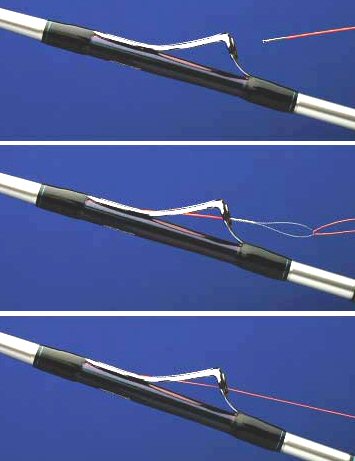
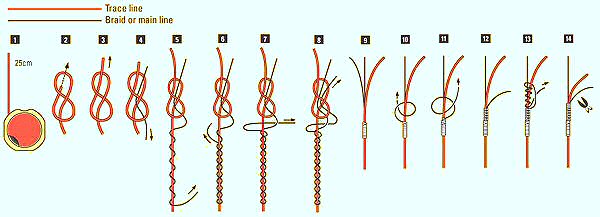

Several helpful tips
Never lift your catch, always play with the fish and use landing net to land it. Always extend and insert telescopic sections very gently, try do not extend them too forcibly, try to keep it off the ground to avoid dirt getting into the joints. Wipe it clean with a cloth before taking it down so you don't jam dirt into the joint, rinse rod with freshwater after using it in saltwater as soon as you can. Always remember to take a good care of your rods and they will work for you for a very long time and will bring you large amount of catches and a huge amount of great emotions. More great emotions - longer and healthier is your life.You should open and close the rod with a special care, always keep control of the rod sections. Telescopic rods can easily take even very heavy load, they are very strong and durable but they need to be handled with cared too. They usually don't break while fighting the fish but they could break while they are being closed without special care. Opening and closing these rods must be done very carefully and gently, no sideway pressure should be applied to the rod while closing it.
Back to top
Opening telescopic rod.
Telescopic rods are very simple to open, but there are a couple of points to keep in mind to simplify the process and avoid damaging the rod:- Uncover and remove the top cover along a line, otherwise it may break the fishing rod. Fix the fishing line reel, pull out the line and drill it through the bottom sections to the top through every section. If the fishing line is in disorder, don't draw the line forcibly. Dragging too forcibly on any point of the fishing rod may result in the break of fishing rod.
- Expose section by section out the fishing rod from top, and screw the joint of two sections till they are tightly fixed.
Closing telescopic rod.
Telescopic rods are closed in the opposite direction, starting with the bottom section and collapsing them all the way to the tip one. It's recommended to hold each section at its thickest point of the section which is near the joint.- After use, loosen the joints in B section and draw in the fishing rod section by section from end.
- Insert the end section into the 2-nd section, the 2-nd section into the 3-rd section, etc.
- To avoid becoming flexible, there is a 4-5mm gap between every connection. Don't ever forcibly insert the section.
If rod sections get stuck at a joint:
Occasionally a section may get stuck. The most frustrating things that can happen to a telescopic fishing rod (after braking) is to become jammed at a joint. This can happen due to dirt/mud/sand in the joint but the main cause of the joints fixed too tightly is extending the rod too forcibly.Prevention is better than cure: try do not extend the rod too forcibly, try to keep your rod off the ground at all times to avoid dirt getting into the joints. Wipe it clean with a cloth before taking it down so you don't jam dirt into the joint. If you've been using it in saltwater give it a quick rinse with freshwater as soon after use as you can. Its a good idea to put a protectant like WD-40, Tackle Guard or a silicon lube on the joints.
When it happens there are several techniques to unstick the sucker.
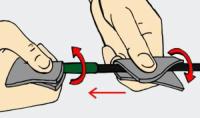

C. If the hot water technique fails try the next step up. Do the same as above but put ice on the small side of the joint to shrink it. This is easiest if you get some ice from your freezer place it on a cloth or towel and then wrap that around the rod and hold it while you heat the other side with hot water.
D. Try a penetrating lubricant like WD-40, CRC or Tackle Guard. Leave the joint to soak for an hour or two and then try gently to take the rod down.
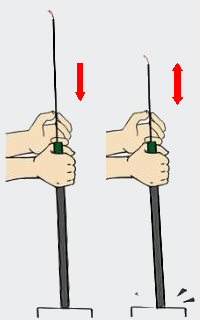
Back to top
Take a good care of your rod.
- Do not use any substitute materials or wire instead of wire designed to operate with this rod.
- Do not kink, bend abruptly or otherwise abuse the threading wire. It could damage the rod.
- Always use the recommended knots for connecting leaders.
- Do not brush inside; this may damage the inside of the rod.
- Accumulated water can be removed by whipping the rod.
- After use rinse out the inside with freshwater and whip the rod to remove excess water. Dry before storage.
- Do not apply oil or lubricant to the inside of the rod as this will impedeline flow.
- Washed the exterior of the rod with freshwater after use.
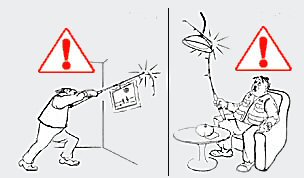

This is one of the most common causes of breakage and is 100% angler-caused
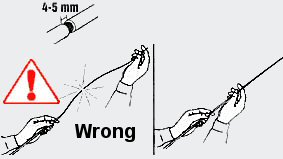

4. Be extra careful when getting your graphite fishing rod out of the car. Too many people break their rod on the car door.
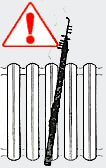
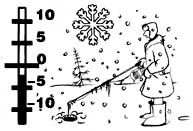
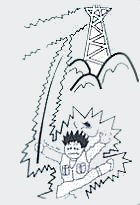
8. If you seal up the damp or sordid fishing rod, the moisture will possibly cause the bubbling or scaling off of lacquer. To prevent this, always rub off the moisture on fishing rod and keep it in a ventilated place. Never store a rod in its tube. Humidity can cause the moisture.
9. Always rub off the moisture, salt and dirt before storage.


Always remember to take a good care of your rods and they will work for you for a very long time and will bring you large amount of catches and a huge amount of great emotions. More great emotions - longer and healthier is your life.


































